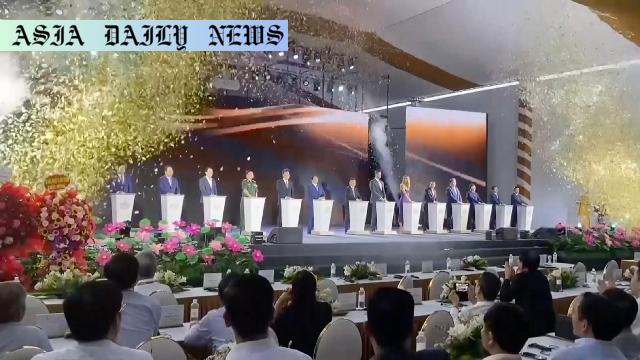Vietnam golf resort: A family firm of US President Donald Trump has started developing a luxury golf resort near Hanoi.
- Vietnam golf resort project worth $1.5 billion developed by Trump’s family firm.
- Groundbreaking ceremony attended by Eric Trump and Vietnam’s PM Chinh.
- Vietnam hopes to strengthen ties with the US amidst trade tensions.
- Criticism arises about potential conflicts of interest and favoritism.

Trump Organization’s New Venture in Vietnam
The Trump Organization has officially commenced the development of a luxurious golf resort in Vietnam, a landmark $1.5 billion project expected to elevate Vietnam’s leisure and tourism industries. The groundbreaking ceremony, held in Hung Yen province near Hanoi, was attended by Eric Trump, Executive Vice President of the Trump Organization, and Vietnamese Prime Minister Pham Minh Chinh. The project is designed to create a prosperous hub for golf enthusiasts and elites, underscoring Vietnam’s growing appeal as an international destination for high-end tourism activities.
This new venture highlights the collaboration between the Trump Organization and Vietnamese authorities. Prime Minister Chinh emphasized the potential of the resort to strengthen bilateral relations between Vietnam and the United States. He remarked that the project offers an avenue for more profound and effective cooperation, particularly given the backdrop of ongoing trade disputes. Such grand projects appeal not only for their economic impact but also for their symbolic value in fostering international relations, especially in a global landscape marked by trade imbalances and political divisions.
Economic and Political Implications
The timing of the project has raised questions, considering the Trump administration’s prior contemplation of imposing a 46% tariff on Vietnamese exports. Vietnam currently holds the undesirable position of being the third-largest trade deficit partner of the United States after China and Mexico. Such a significant disparity has fueled economic tension between the two nations. However, Hanoi’s proactive measures to strengthen ties with the US could potentially ease the strain. Prime Minister Chinh’s call for local officials to support the project underscores the government’s drive to utilize the resort as a diplomatic tool to foster goodwill and mitigate potential tariff threats.
While the project reflects a deep understanding of leveraging economic projects as soft diplomacy tools, it has not been immune to controversy. Critics argue that luxurious developments like this often serve to favor specific elite groups and may lead to conflicts of interest, especially given the Trump Organization’s ties to the former US president. Such projects risk being seen as mechanisms used to negotiate favorable political outcomes, offering fertile ground for accusations of ethical ambiguity.
Criticism and Civic Pushback
A North American civic group has voiced intense criticism of the resort, describing it as a blatant example of leveraging foreign governments for private business gain. They view the project as a troubling depiction of how connections between political power and private enterprises can blur boundaries. This intersection raises ethical concerns regarding fairness, transparency, and the division between a public official’s private business interests and their political influence, further igniting debates surrounding the complex ties between politics and global economic ventures.
Despite these criticisms, the economic benefits for Vietnam cannot be understated. The project is expected to boost tourism revenue, create jobs, and reinforce Vietnam’s position on the global tourism map. However, policies ensuring sustained benefits for local communities, environmental protection, and ethical transparency will be pivotal to address the growing skepticism and scrutiny.
Potential Long-Term Impact on Vietnam-US Relations
The political connotations of the project are profound, marking a significant moment in Vietnam-US relations. Vietnam’s leadership has displayed a strong intention to capitalize on the venture by portraying it as a gesture of goodwill and an indication of their dedication to improving bilateral ties. This ambitious project represents a rare confluence of business priorities and diplomatic ambitions, with both Vietnam and the Trump Organization standing to gain significant outcomes.
If the golf resort delivers on its promises, it could symbolize a leap forward in Vietnam-US economic relations. It demonstrates how soft diplomacy through infrastructure investments can pave the way for sustained dialogues and partnerships. In light of this, maximizing long-term socioeconomic gains for local communities will be critical to the project’s overall success and legacy.



Commentary
The Ambiguity Surrounding Luxury Projects and Diplomacy
Luxury development projects such as the $1.5 billion golf resort in Vietnam are often an amalgamation of economic ambition, political strategy, and personal interests. At first glance, the groundbreaking ceremony marked by the presence of Eric Trump and Prime Minister Pham Minh Chinh offers a promising vision of collaborative success. However, the layers of complexity underneath this venture inevitably invite skepticism, highlighting the blurred lines between diplomacy and private enterprise.
On one hand, it is commendable to see Vietnam actively seeking opportunities to strengthen ties with countries like the US. By engaging in high-profile ventures that enhance tourism and infrastructure, Vietnam demonstrates its determination to cement its identity as a rising economic hub in Asia. Such projects can significantly uplift local economies by generating revenue, creating job opportunities, and showcasing Vietnam’s scenic landscapes to the world. For a country navigating complicated relations with many of its trade partners, this golf resort symbolizes optimism and strategic alignment.
Unintended Consequences and Public Perception
Yet, as promising as such ventures may appear, they inevitably face criticisms for favoring exclusivity over inclusivity. Civic groups criticizing the involvement of foreign governments in private business dealings deserve attention. The Trump Organization’s strong ties to the former president naturally cast doubt over whether this project will truly support Vietnam’s public interests, or if it is primarily about private gain. Projects of this magnitude must demonstrate transparency and accountability to mitigate concerns over ethical boundaries.
Overall, while the economic opportunities and improved bilateral ties brought on by this project cannot be downplayed, they must be balanced against local impacts, ethical considerations, and global public perception. The next steps for Vietnam, its leaders, and involved organizations will determine whether this ambitious venture becomes a shining example of economic diplomacy or a contentious subject of debate.